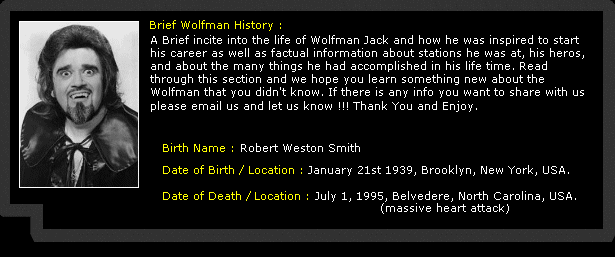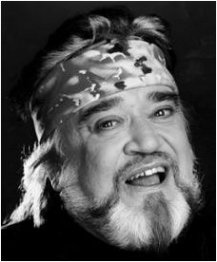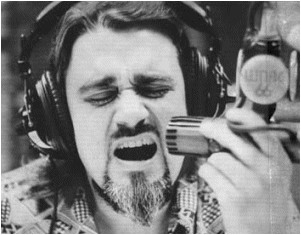 |
|||||||||
|
|
|||||||||
|
|
|||||||||
| For
millions, Wolfman Jack--indisputably the world's most famous DJ--was the
master of ceremonies for the rock 'n' roll generation of the '60s on radio,
and later on television during the '70s. In the early 1960s, when much
of the airwaves were segregated, Bob Smith created his shadowy wild man
alter ego so that he could DJ on the radio the "rhythm and blues" race
records n he loved so much. As the enigmatic Wolfman Jack, the young white
man from one of Brooklyn, one of New York's toughest neighborhoods, could
easily hide behind a voice that masked his true ethnic roots. Many teens
first discovered The Wolfman while scanning the AM radio band as they cruised
Main Street U.S.A. Out of the night came a howling, guttural, ethereal
voice amid a collection of rock 'n' roll, inner-city ethnic rhythm, and
deep south blues records that wouldn't be found on any "legal" radio station.
Indeed, Wolfman Jack held Court over his young audience from XERF-AM, just
south of Cuidad Acuna, Mexico, where the 250,000 watt signal -- five times
more powerful than any U.S. radio station -- blanketed most of North America.
Without the benefit of traditional advertising, it was word of mouth that
spread the news about the provocative Wolfman and his nonconformist style
-- the kind of style that horrified parents, making it all the more appealing
to a growing legion of young followers. But the Wolfman Jack story began
much earlier, in 1949, when radio reached through to a troubled youngster.
As the Fifties arrived and rock 'n' roll music found its way into suburban
America, Bob Smith imagined himself behind the mix spinning the turntables,
and taming that jive DJ talk. His over-the-air heroes, black and black-influenced
DJs like Dr. Jive, Jocky Jack, Professor Bob, Sugar Daddy, and others spoke
to him, taking him to a secret place -- away from the pain of still growing
up -- off into a world of music unlike anything his family could understand.
Not yet 21 years old, Bob loaded up his car, determined to reach Hollywood and find his fortune, but he got only as far as Alexandria, Virginia, making a stop that lasted two years. Living with his sister and brother-in-law in Alexandria, Bob worked at various jobs while studying for his FCC license at the National Academy of Broadcasting. Supporting himself by selling door-to-door everything from encyclopedias to Fuller brushes, he spent his nights studying complicated mathematics needed to obtain his radio engineering license. It seems he had found his calling, as the high-school dropout easily rose to the head of his class with a straight -A average.
His first professional radio job was at WYOUAM, Newport News, Virigina
where Bob took his first air name --
Remembering the success of Alan Freed's shows in New York, Bob thought he could create a venue for rhythm & blues in the Newport News area, so he opened a dance club. The integrated club -- not especially popular in 1961 -- got the attention of the local chapter of the Ku Klux Klan and threats were made, ending in a crossburning on the lawn of his house. But even Virginia was just a stop on the road to fame. In 1962, Bob moved on to Shreveport. Louisiana where he quickly became a ratings success on KCIJ-AM as "Big Smith with the Records." Still, the potential of a local radio station couldn't begin to fulfill his dream of becoming a nationally known DJ. Yet, it was here that The Wolfrnan Jack character actually first came to mind while Bob was playing records on KCIJ. Just a hop, ionosphere skip, and a jump from Shreveport was the home base of XERF-AM, a superpowerful radio station in Mexico, just over the border at Del Rio, Texas. Filling its air time with U.S.based preachers selling all sorts of religion, XERF was reaching millions of listeners across North America, and by all accounts was making millions for the preachers who bought time on the station. The true odyssey from Louisiana, to fame and fortune as Wolfman Jack on XERF in 1964, equals any hollywood fabricated mini series you might see on TV, complete with bags stuffed with hundred-dollar bills in the trunk of a Cadillac convertible, and a shoot-out at the desert compound where the XERF transmitter was located. The entire story, to be recounted in his biography, Have Mercy! Wolfman Jack, The Original Rock 'n' Roll Animal, will be published next year by Warner Books. It was the beginning of an incredible journey to stardom that has lasted three decades -- reaching around the world. By 1965 Wolfman Jack had moved to a new base of operations, XERB-AM, another power-pumping clear channel radio station located across the border on Mexico's Baja peninsula, at Rosarita Beach, near Tijuana. Beaming his now-trademark mix of rowdy rock, raw rhythm and blues, and verbal antics, Wolfman quickly found a new legion of fans from Southern California, up through the Great Northwest, into the remote regions of Alaska and Canada. At the same time, the national press was beginning to take notice, and stories began to surface in Time, Newsweek, Life and major newspapers around the world. Leading recording artists like Todd Rundgren, Leon Russell, Freddie King and the Guess Who wrote chart-making songs about The Wolfman, and his popularity spiralled upward. StiR questions persisted: Who is Wolfman Jack? Where does he come from? What does he look like? Only Bob Smith knew allthe answers, and he was keeping them closely guarded.
One of the teens touched by Wolfman's radio programs was budding fammaker,
George Lucas, who remembered The Wolfman when he wrote a simple screenplay,
a tale of four friends in a small northern California town -- graduates
of the Class of '62 -- preparing to go their separate ways. Whenitwas releasedin
1973, Lucas' "American Graffiti" earned four Academy Award nominations
and $55 million at the box office, making it one of the most successful
films of the year. The movie also, once and for all, removed the mystery
behind Bob Smith's character, and Wolfman Jack was about to make a transition
from a cult figure to a full-fledged media megastar.
By the 1990s, the Wolfman was doing a weekly syndicated radio show for Liberty broadcasting from a Planet Hollywood restaurant in Washington, D.C. On July 1st, 1995, he had just completed a 20-day trip to promote his new book "Have Mercy, The Confession of the Original Party Animal," about his early career and parties with celebrities. "He walked up the driveway, went in to hug his wife and then just fell over," said Lonnie Napier, vice president of Wolfman Jack Entertainment. Wolfman Jack, one of the nation's most recognizable personalities, died of a heart attack. He is survived by his wife, Lou Smith; a daughter Joy Rene Smith (who as well passed away shortly after him), and a son, Tod Weston Smith. Wolfman was only 57.
Way back in the fifties, man, you could drive all the way across this rockin' n' rollin' country, all the way from New York to L.A. and never lose the Wolfman. For eight years from 1958 to 1966, Wolfman Jack howled nightly on XERF, a 250,000 watt Mexican station just north of Del Rio, Texas. That was back in the days when the kids wore d.a. haircut, peg pants and cruised around the Boulevard in customized cars with the radio blasting, drinking beer and looking for chicks. Wolfman Jack is the personification of that era, of the very special kind of radio that grew up in that era, personality radio, one person rapping and joking and howling along with one person, or one million, the kind of radio people listened to in the Fifties. America's seen a lot if changes since then-- the Rockin' n' Rollin' Fifties turned into the Acid Sixties, and now the Seventies, the Nostalgic Seventies. Sure there were always people around in the Sixties who wanted to be entertained, to rock n' roll and cruise about like in the old days, all those Wolfman Jack fans who listened to the man every night faithfully on XERB from 1966 to 1971. But the music had changed-- like the Wolfman says, "The music from 1956 to 1962 was a much happier music. They sang about love. They sang about having fun. They sang about rocking and rolling and dancing. They sang: "Short Fat Fanny she's my heart's desire / Short Fat Fanny set my soul on fire / Short Fat Fanny yes I love her so / Never let Short Fanny go.' They were stupid songs but they were fun. Now every album has a theme; either they're really down on the war, or they're down on the political thing, or they're hyping drugs. Half the time I feel like I'm appealing to the downer freaks out there. We start to play one downer record after another until I begin to get down myself. Give me something from 1960 or something; let me get up again. The music of today is for downer freaks, and I'm an upper."
And now the wheel's turning, The folks who were teenagers in the Fifties
are settled enough in their middle-class niches to start looking
back without embarrassment and the younger ones want to know what there
was in the Fifties to be embarrassed about. Wolfman Jack in their contact
-- our contact to the Lost Decade, someone to help you remember the way
it was, or the way you think it might have been.
Wolfman Jack started out in 1956 experiencing the Fifties as a teenager while, at the same time, becoming one of the radio legends of that decade. With the musical transitions of the Sixties-- the Jimi Hendrix's and Led Zeppelin's-- the Wolfman found himself less and less able to really relate to the music he was spinning on his nightly broadcasts. Now, as the music of the Seventies emerges from its infancy, one trend becomes apparent; there is a growing nostalgia for the feeling that Wolfman Jack grew up with, the rockin' n' rollin' joy of 1956.
Wolfman has always been as concerned with the music, the records he played
as with the slightly maniacal continuity with which he fills the time between
them. And now that rock music has begun to come full circle, Wolfman Jack
sees an opportunity to make a personal contribution to the music available
to his listeners. Wolfman's tried singing before-- at his personal appearances
with Carla Thomas, the Checkmates and Canned Heat-- but somehow the right
combination of label, producer and material never came along. The timing
just wasn't right. But Jim Golden of Wooden Nickel Records and Don Sciarotta,
his producer, changed all
Wolfman Jack's gravelbed throat may limit his vocal range, but his sensitivity to music and lyrics-- his sensitivity to people should provide more than background enough to prove Wolfman Jack a unique and versatile recording artist.
1.Midnight
(1989)
1."Married... with Children" (1987) playing "Himself" in episode:
"Ship Happens: Part 1"
|



